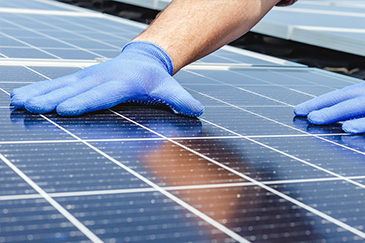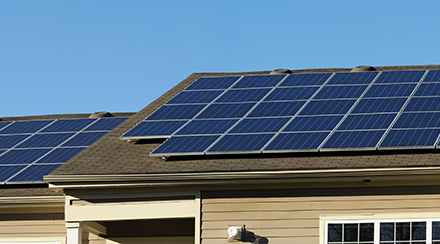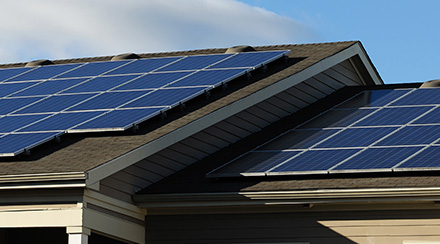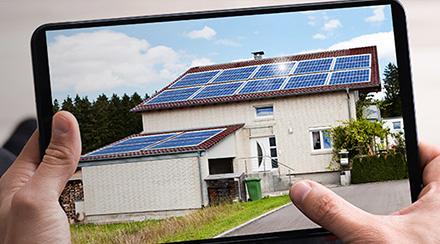What Is Solar Energy and How Does it Work?

The energy we use to power our homes and businesses comes from a multitude of sources; fossil fuels, natural gas and nuclear power account for the majority of our energy mix. But thanks to rapidly advancing technology, a growing share of our energy comes from renewable sources like wind, hydropower and solar.
What is Solar Energy?
Solar energy refers to the energy we harvest from the sun’s electromagnetic radiation – or, in plain speak, sunlight. According to the Department of Energy, the amount of sunlight that reaches the surface of the earth in 90 minutes is enough to meet the entire world’s energy needs for a year.
The challenge is to capture, store and distribute as much of that energy as possible, and energy engineers are meeting that challenge by constantly expanding our solar capacity and advancing the state of solar technology.
How Is Solar Energy Harvested?
Most solar renewable energy technologies fall into one of two categories: photovoltaics and concentrating solar-thermal power.
Photovoltaic solar systems are the more recognizable of the two; the black, rectangular panels you see on some residential rooftops and in large-scale solar parks are called photovoltaic solar panels. When sunlight falls upon these rooftop solar panels, a semiconductor converts the particles of electromagnetic radiation into electrons, which flow as a direct electrical current into an inverter. The inverter then converts the direct current to an alternating current, which is finally routed through the electrical grid and into the home or building on which the solar panels are installed.
Concentrating Solar-Thermal Power (CSP) systems harvest energy from the sun’s heat, not its light. These systems use mirrors to reflect concentrated sunlight onto fluid-filled receivers, and the extreme heat transferred to this fluid is stored and used as thermal energy. Less common than photovoltaics, CSPs are typically found at solar power plants, where rows of mirrors reflect concentrated light onto massive receivers. There are also smaller CSP systems that look similar to satellite dishes, and these solar installations are usually installed at other types of industrial-scale facilities to generate large amounts of thermal energy on-site.
Clean, renewable solar power is here to stay, and its use will only become more widespread with the ongoing advancement of solar technologies.
Why is Solar Energy Important?

Solar is among the most modern energy sources in the mix. But if we already have tried-and-true sources like coal and natural gas, why does solar energy matter?
Solar is renewable. Unlike fossil fuels, which are continuously depleted by our growing energy needs, sunlight will remain plentiful
Solar is clean. Energy generation from fossil fuels creates greenhouse gas emissions that are harmful to the environment, but as we decrease our dependence on fossil fuels and increase our use of renewable energy, we reduce the emissions that drive climate change and other environmental problems.
Solar is healthy. In addition to the environmental effects of fossil fuel-based energy, there are also effects on human health. By reducing emissions, we can improve respiratory health and bring relief to people for whom air quality is a serious medical concern.
Solar is economical. Sunlight is free and plentiful, and with an investment in solar equipment, you can harvest free energy every day with very little ongoing maintenance.
Solar can give you independence. Homeowners can choose from different types of solar panels to offset their monthly electricity costs, and some can even earn money by selling excess electricity back to the electrical grid. And with the addition of a home battery, you can also store electricity that can be used in the event of a power outage, giving you a greater degree of independence from the grid.
Looking for Something Specific?
Select a category to find resources for topics that interest you.
Select Category

Related Articles:

How Do Solar Panels Work?
Rooftop solar panels are among the most visible symbols of a new energy future that is cleaner, healthier and more renewable. But do you know how solar panels work?
Read Article
The Different Types of Solar Panels
When deciding what type of solar panel is best for your home, it’s worth taking the time to weigh the pros and cons of each panel type against your budget, climate and energy needs.
Read Article
How Much Do Solar Panels Cost?
All solar installations are customized based on the size, design and energy needs of the home, so there is no one-size-fits-all price. Let’s review the basic factors that affect the cost of solar installation.
Read ArticleWhat Is Solar Energy and How Does it Work?
The energy we use to power our homes and businesses comes from a multitude of sources; fossil fuels, natural gas and nuclear power account for the majority of our energy mix. But thanks to rapidly advancing technology, a growing share of our energy comes from renewable sources like wind, hydropower and solar.
What is Solar Energy?
Solar energy refers to the energy we harvest from the sun’s electromagnetic radiation – or, in plain speak, sunlight. According to the Department of Energy, the amount of sunlight that reaches the surface of the earth in 90 minutes is enough to meet the entire world’s energy needs for a year.
The challenge is to capture, store and distribute as much of that energy as possible, and energy engineers are meeting that challenge by constantly expanding our solar capacity and advancing the state of solar technology.
How Is Solar Energy Harvested?
Most solar renewable energy technologies fall into one of two categories: photovoltaics and concentrating solar-thermal power.
Photovoltaic solar systems are the more recognizable of the two; the black, rectangular panels you see on some residential rooftops and in large-scale solar parks are called photovoltaic solar panels. When sunlight falls upon these rooftop solar panels, a semiconductor converts the particles of electromagnetic radiation into electrons, which flow as a direct electrical current into an inverter. The inverter then converts the direct current to an alternating current, which is finally routed through the electrical grid and into the home or building on which the solar panels are installed.
Concentrating Solar-Thermal Power (CSP) systems harvest energy from the sun’s heat, not its light. These systems use mirrors to reflect concentrated sunlight onto fluid-filled receivers, and the extreme heat transferred to this fluid is stored and used as thermal energy. Less common than photovoltaics, CSPs are typically found at solar power plants, where rows of mirrors reflect concentrated light onto massive receivers. There are also smaller CSP systems that look similar to satellite dishes, and these solar installations are usually installed at other types of industrial-scale facilities to generate large amounts of thermal energy on-site.
Clean, renewable solar power is here to stay, and its use will only become more widespread with the ongoing advancement of solar technologies.
Why is Solar Energy Important?
Solar is among the most modern energy sources in the mix. But if we already have tried-and-true sources like coal and natural gas, why does solar energy matter?
Solar is renewable. Unlike fossil fuels, which are continuously depleted by our growing energy needs, sunlight will remain plentiful
Solar is clean. Energy generation from fossil fuels creates greenhouse gas emissions that are harmful to the environment, but as we decrease our dependence on fossil fuels and increase our use of renewable energy, we reduce the emissions that drive climate change and other environmental problems.
Solar is healthy. In addition to the environmental effects of fossil fuel-based energy, there are also effects on human health. By reducing emissions, we can improve respiratory health and bring relief to people for whom air quality is a serious medical concern.
Solar is economical. Sunlight is free and plentiful, and with an investment in solar equipment, you can harvest free energy every day with very little ongoing maintenance.
Solar can give you independence. Homeowners can choose from different types of solar panels to offset their monthly electricity costs, and some can even earn money by selling excess electricity back to the electrical grid. And with the addition of a home battery, you can also store electricity that can be used in the event of a power outage, giving you a greater degree of independence from the grid.
Looking for Something Specific?
Select a category to find resources for topics that interest you.
Select Category

Related Articles:

How Do Solar Panels Work?
Rooftop solar panels are among the most visible symbols of a new energy future that is cleaner, healthier and more renewable. But do you know how solar panels work?
Read Article
The Different Types of Solar Panels
When deciding what type of solar panel is best for your home, it’s worth taking the time to weigh the pros and cons of each panel type against your budget, climate and energy needs.
Read Article
How Much Do Solar Panels Cost?
All solar installations are customized based on the size, design and energy needs of the home, so there is no one-size-fits-all price. Let’s review the basic factors that affect the cost of solar installation.
Read Article






